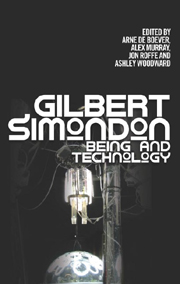1 - Technical Mentality
Published online by Cambridge University Press: 12 September 2012
Summary
This chapter is not concerned with ontology but with axiology. It aims to show that there exists a technical mentality, and that this mentality is developing, and is therefore incomplete and at risk of being prematurely considered as monstrous and unbalanced. It requires a preliminary attitude of generosity towards the order of reality that it seeks to manifest, because this incomplete genesis brings into play values that a general refusal [of this mentality] could condemn to ignorance and would risk negating.
We will try to show that the technical mentality is coherent, positive, productive in the domain of the cognitive schemas, but incomplete and in conflict with itself in the domain of the affective categories because it has not yet properly emerged; and finally, that it is without unity and is almost entirely to be construed within the order of the will.
COGNITIVE SCHEMAS
The theoretical domain was the first to emerge in Western civilizations, the first to have been theorized, systematized and formalized. It has led to productive constructions and it presents in itself a method of discovery and interpretation that can be generalized. In this sense, the technical mentality offers a mode of knowledge sui generis that essentially uses the analogical transfer and the paradigm, and founds itself on the discovery of common modes of functioning – or of regime of operation – in otherwise different orders of reality that are chosen just as well from the living or the inert as from the human or the non-human.
- Type
- Chapter
- Information
- Gilbert SimondonBeing and Technology, pp. 1 - 16Publisher: Edinburgh University PressPrint publication year: 2012



